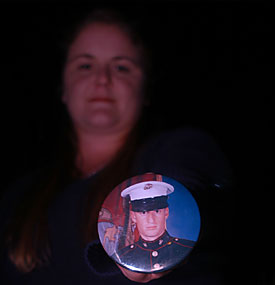 |
|
KEVIN KLAUS/Arizona Daily Wildcat
|
History junior Carrie Ramsey holds up a pin of her brother Sean who is serving in the war in Iraq. Ramsey is one of many UA students whose lives are closely tied to the war because they have family members overseas.
|
|
By Aaron Mackey
Arizona Daily Wildcat
Friday April 18, 2003
Family members try to live normal lives while loved ones serve U.S.
For many students, Iraq is a world away; for Michelle Gibson, it's much closer.
Gibson, a family studies and human development junior, wears on her wedding finger a constant reminder of the conflict in Iraq and its effects on her life.
Gibson, whose husband T.J. is a petty officer third class serving on a ship in the Persian Gulf, is one of a number of UA students who have loved ones serving overseas.
Although the war in Iraq has seemed to calm since the country's liberation last week, worry, anxiety and fear are still common emotions for family members of the more than 250,000 coalition troops in the Gulf. About 1.4 million military personnel are serving active duty around the world.
However, Gibson has found that keeping busy helps her get through her day and keep her mind off the fact that her husband, who she hasn't seen since January, faces danger daily.
The Gibsons married Nov. 30, 2002, although they had originally planned on a March 1 wedding. However, as soon as they learned T.J. was going to be deployed in January, they decided to move the date up, and were wed in a small family ceremony in Yuma, Michelle's hometown.
More than 50 percent of all military personnel are married, according to a recent Newsweek article, and quick marriages prior to deployment are common.
But still, the family members left at home are forced to search for a normal lifestyle in the absence of their loved ones.
Gibson, who could not reveal the name of the ship her husband is stationed on, is taking 18 units this semester, as well as working 20-30 hours per week.
"I took a lot of classes this semester on purpose," she said.
History junior Carrie Ramsey also agreed that a busy routine is crucial to maintaining her composure while her brother Sean, a member of a Marine Reserve Unit, is stationed overseas.
Ramsey, who helped plan last month's Support our Troops/Support America rally, also works part time while attending UA.
"(Staying busy) helps because sometimes you really do have to get away from the TV," Ramsey said.
This war, unlike any other, is the first in which viewers can watch live coverage of the action, a facet that can be both comforting and disturbing to family members of servicemen and women.
"I don't pay attention to (the media coverage). The media doesn't really know what's going on," Gibson said, adding that the extensive coverage makes her worry even more.
However, Ramsey said that the in-depth reporting of the war is a commodity that she could not do without.
"(The coverage) is helpful to me because I know what is going on," Ramsey said.
The television also gives her a small chance to possibly see her brother.
"You always look," Ramsey said as she explained how she finds herself constantly searching soldiers' faces, hoping to see Sean.
Ramsey also enjoys the news broadcasts because she doesn't know exactly where her brother is. She said she appreciates the up-to-date information, especially since it takes about two to three weeks for letters from Sean to arrive.
But she said that every letter she receives boosts her morale and comforts her while her brother is in the middle of the conflict.
Gibson, on the other hand, considers herself lucky when it comes to communication, as T.J.'s ship is equipped with e-mail, which allows the couple to correspond at least once a day.
The pair focus solely on discussing the positive events of their day, something that Gibson said brings her closer to her husband, although he is so far away.
"He feels like he's still here, and that he's not missing anything," Gibson said.
Despite Gibson and Ramsey's attempts to stay busy, both have found that they are constantly thinking about their loved ones.
"I still worry about him just because he's not here," Gibson said.
While in classes, Ramsey said she thinks of her brother often, sometimes composing one of the three letters she writes him weekly.
"I can still concentrate, but I would rather be writing a letter, or watching the news than doing homework right now," Ramsey said.
When trying to stay busy doesn't work, Gibson and Ramsey turn to other family and friends, whose support, they said, helps immensely.
Gibson's family and her in-laws have been crucial in helping her vent her fears, she said. In turn, through nearly constant contact and updates, she helps them.
"It helps (T.J.'s parents) feel closer to him," Gibson said.
Ramsey said her family has also developed a closer-knit relationship, and that they often talk about new developments in the war.
"It's always better to share your feelings and know that somebody shares your concerns," she said.
Both women said that while they and their families worry about their loved ones overseas, it is important to keep hope and support.
"Just keep yourself busy and keep praying that all our soldiers come back home safe to us," Gibson said.
"Just keep hope. Keep in touch with family. Write them letters. Just keep hope," Ramsey said.
Another Support our Troops/Support American rally is planned for April 26.

